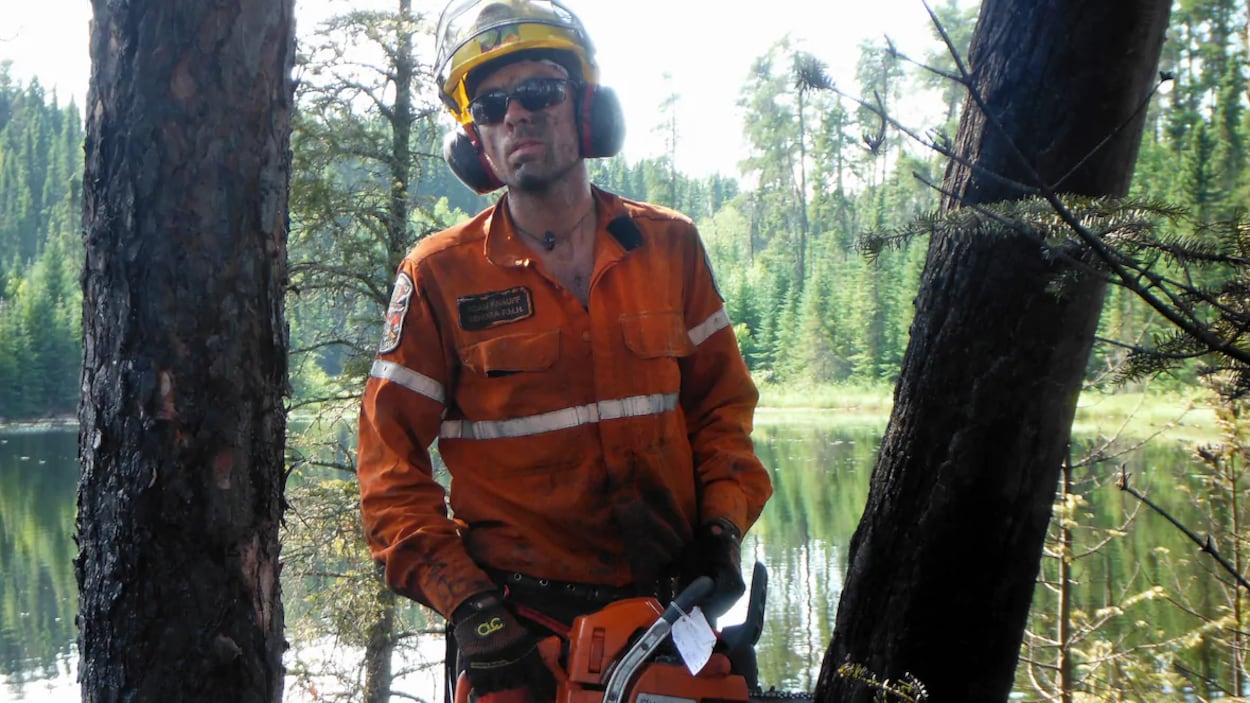Adam Knauff tried to enforce veganism as a right after he was disciplined at work.
The vegan firefighter was suspended in 2017 for protesting against his employer for not giving him proper meals at work. He had filed a discrimination complaint against the Ontario Ministry of Natural Resources.
Adam Knauff's defense claimed during the hearings that veganism was more than a lifestyle choice or a way of life: it was a belief. She even talked about ethical behavior and an undeniable feature of her client's identity.
Because it was a non-religious belief, the firefighter's defense therefore argued that it was a right enshrined in the Ontario Human Rights Code, as are religious beliefs that, for example, prohibit certain types of food.

Open in full screen mode
Firefighter Adam Knauff hoped that veganism would be recognized in Canada as a non-religious belief for the cause of animals.
Photo: COURTESY OF ANIMAL JUSTICE
The 44-year-old Ontario man claimed he was discriminated against because of his ethical veganism and was unfairly suspended without pay when he complained to his employer while on assignment in the western part of the country.
In her decision, Ontario Human Rights Tribunal Judge Karen Dawson wrote that the defense could not prove that ethical veganism meets any of the criteria associated with a non-religious belief under the Code.
Criteria for Determining a Faith in Ontario
- A belief is sincere, deep, and freely accepted;
- It is closely related to the way the person defines themselves and thrives on a spiritual level.
- It deals with the ultimate questions of human existence, such as life or death or whether or not there is a higher order or creator;
- It represents a particular belief system, both comprehensive and fundamental, that governs the person's behavior and practices;
- She has a connection to a community that shares the same beliefs.
Source: Ontario Human Rights Commission
Ms. Dawson readily admits that veganism meets the first two criteria.
However, she explains that Mr. Knauff's defense did not demonstrate that ethical veganism concerns the ultimate questions of human existence or the existence or non-existence of a higher order or creator.
The arbitrator emphasizes that vegan beliefs are not non-religious beliefs because they do not meet this third criterion.

Open in full screen mode
Adam Knauff says he is against all animal cruelty, the exploitation of dairy cows and laying hens and the intensive practice of monocultures.
Photo: COURTESY OF ANIMAL JUSTICE
Mr. Knauff's key witness, sociopsychologist Melanie Joy, nevertheless said during the hearings that ethical veganism calls into question the meaning of life and people's place in the world and the cosmos. She also questioned why a compassionate universe would allow the suffering inflicted on animals.
However, Ms. Dawson explains that Ms. Joy's comments are only very general philosophical observations and do not demonstrate how ethical veganism addresses the existence or non-existence of another order of existence or Creator.
“Accordingly, I am of the opinion that ethical veganism per se does not constitute a non-religious belief within the meaning of the Code,” concludes arbitrator Dawson, rejecting Mr. Knauff’s allegations of discrimination.

Open in full screen mode
The Ontario Human Rights Tribunal is located in this building in downtown Toronto.
Photo: Radio-Canada / Julia Kosak
According to them, the firefighter could not have suffered discrimination from his employer or even retaliation regarding his dietary habits, as ethical veganism is not a human right within the meaning of the Code.
Unsatisfied reactions
In a statement, Mr. Knauff's lawyer called the decision surprising and troubling. Wade Poziomka writes that he plans to seek judicial review in a higher court.
He said he was amazed that the court recognized that faith includes non-religious beliefs but rejected veganism as a form of belief because it does not refer to the existence or non-existence of a creator or higher order of existence.
Me Poziomka recalls that the Ontario Human Rights Commission revised its Faith Discrimination Policy in 2015 to provide greater protection for people with non-religious beliefs.

Open in full screen mode
Freedom of conscience and religion is enshrined in Section 2a of the Canadian Charter of Rights and Freedoms.
Photo: Radio-Canada / David Horemans
The commission writes that faith can also include non-religious belief systems that, like religion, significantly influence a person's identity, worldview and way of life.
Vegans are certainly connected to a higher order belief system and this evidence was presented to the court, writes Me Poziomka.
The Animal Justice group, which had unsuccessfully sought intervenor status in this case, was also very disappointed.
Its first director, lawyer Camille Labchuk, affirms that the essence of ethical veganism meets all the criteria of the definition of a non-religious faith, as it is based on compassion and respect for animals.
It is incredibly disappointing that the court has failed to protect vegan people from discrimination simply because their belief system does not center on the existence of a creator, she said.
Me Labchuk also believes that the arbitrator erred in law by refusing to consider the Canadian Charter, which she says states that veganism is a right enshrined in Article 2a.
She emphasizes that there is also room for analyzing international case law on the issue, such as in the UK, where a court ruled in 2020 that ethical veganism is now protected by anti-discrimination laws.
Mr. Knauff did not want to grant us an interview. Me Labchuk added that he is tired after seven years of fighting but will not give up.

